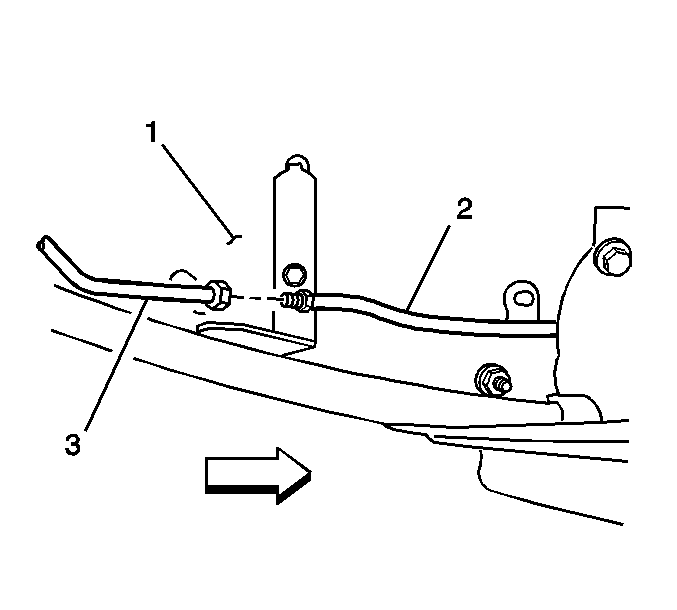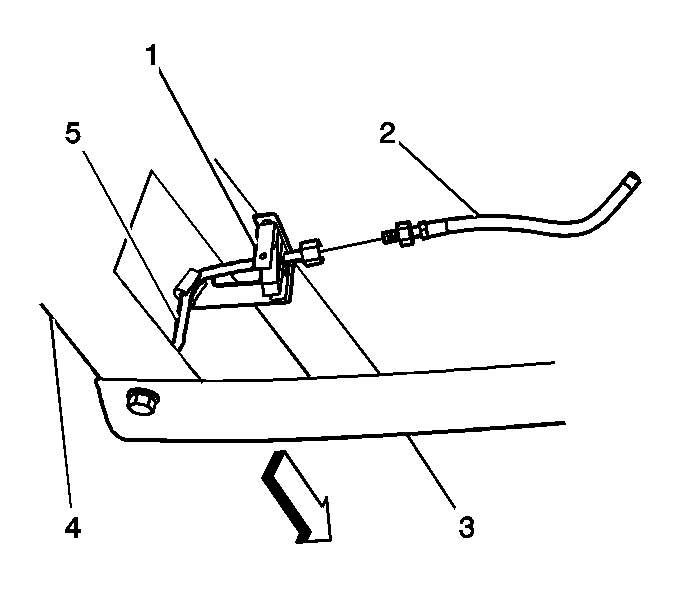Tools Required
J 41416 Ultrasonic Leak Detector
Removal Procedure
- Relieve the fuel system pressure. Refer to Fuel Pressure Relief .
- Disconnect the negative battery cable. Refer to Battery Negative Cable Disconnection and Connection in Engine Electrical in the C/K Pickup service manual.
- Raise and support the vehicle. Refer to Lifting and Jacking the Vehicle in General Information in the C/K Pickup service manual.
- Disconnect the HPR fuel outlet line (3) from the chassis fuel line (2).
- Disconnect the chassis fuel line (5) from the low pressure lock-off (LPL) fuel line (2).
- Disconnect the chassis fuel line (5) from the frame rail clips (1).
- Remove the line from the vehicle.
Caution: Natural gas is highly flammable. In order to reduce the risk of fire and personal injury, keep sparks, flames, and smoking materials away from the vehicle while you perform the Compressed Natural Gas (CNG) fuel system service.
Caution: The Compressed Natural Gas (CNG) system operates at pressures up to 24820 kpa (3600 psi). Relieve the CNG fuel system pressure before servicing CNG fuel system components in order to reduce the risk of fire and personal injury.
Caution: Unless directed otherwise, the ignition and start switch must be in the OFF or LOCK position, and all electrical loads must be OFF before servicing any electrical component. Disconnect the negative battery cable to prevent an electrical spark should a tool or equipment come in contact with an exposed electrical terminal. Failure to follow these precautions may result in personal injury and/or damage to the vehicle or its components.


Installation Procedure
- Install the chassis fuel line (5) into the vehicle.
- Insert the chassis fuel line (5) into the frame rail clips (1).
- Connect the chassis fuel line (5) to the low pressure lock-off (LPL) solenoid line (2) using a new O-ring face seal. Lubricate the O-ring with petroleum jelly.
- Connect the chassis fuel line (2) to the high pressure regulator (HPR) fuel outlet line (3) using a new O-ring. Lubricate the O-ring face seal with petroleum jelly.
- Install the negative battery cable. Refer to Battery Negative Cable Disconnection and Connection in Engine Electrical in the C/K Pickup service manual.
- Start the vehicle and inspect for CNG fuel leaks at the serviced fitting using the J 41416 or an equivalent liquid leak detector.

Caution: Natural gas is stored under high pressure. If a leak occurs, the high pressure could cause a personal injury. In order to prevent Compressed Natural Gas (CNG) fuel leaks, always replace the CNG fuel system O-rings during service.
Tighten
Tighten the fuel line to 37 N·m (27 lb ft).

Tighten
Tighten the fuel line to 37 N·m (27 lb ft).
Caution: Unless directed otherwise, the ignition and start switch must be in the OFF or LOCK position, and all electrical loads must be OFF before servicing any electrical component. Disconnect the negative battery cable to prevent an electrical spark should a tool or equipment come in contact with an exposed electrical terminal. Failure to follow these precautions may result in personal injury and/or damage to the vehicle or its components.
